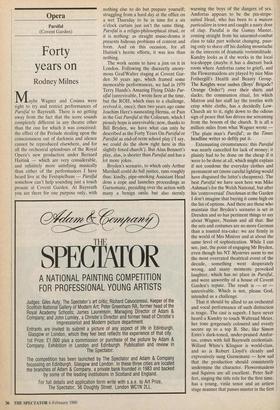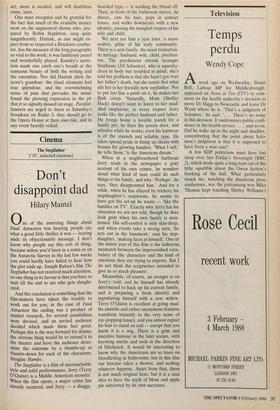Opera
Parsifal (Covent Garden)
Forty years on
Rodney MIInes
Maybe Wagner and Cosima were right to try and restrict performances of Parsifal to Bayreuth. There is no getting away from the fact that the score sounds completely different in any theatre other than the one for which it was conceived: the effect of the Prelude stealing upon the consciousness out of darkness and silence cannot be reproduced elsewhere, and for all the orchestral splendours of the Royal Opera's new production under Bernard Haitink — which are very considerable, and infinitely more satisfying musically than either of the performances I have heard live at the Festspielhaus — Parsifal somehow can't help sounding just a touch prosaic at Covent Garden. At Bayreuth you are there for one purpose only, with nothing else to do but prepare yourself; struggling from a hard day at the office on a wet Thursday to be in time for a six o'clock curtain just isn't the same thing. Parsifal is a religio-philosophical ritual, or it is nothing: as straight music-drama it presents hideous problems of content and form. And on this occasion, for all Haitink's heroic efforts, it was less than nothing.
The work seems to have a jinx on it in London. Following the discreetly anony- mous Graf/Walter staging at Covent Gar- den 30 years ago, which framed some memorable performances, we had in 1979 Terry Hands's Amazing Flying Dildo Par- sifal (unrevivable, I wrote here at the time, but the ROH, which rises to a challenge, revived it, once); then two years ago came Joachim Herz's nauseating Hernia, or Pain in the Gut Parsifal at the Coliseum, which I piously hope is unrevivable; now, thanks to Bill Bryden, we have what can only be described as the Forty Years On Parsifal or Parsifal as end-of-term school play CI say, we could do the show right here in this slightly foxed church'). But Alan Bennett's play, alas, is shorter than Parsifal and has a lot more jokes.
Bryden's scenario, to which only Arthur Marshall could do full justice, runs roughly thus: kindly, pipe-smoking Assistant Head dons a cope and launches proceedings as Gurnemanz, presiding over the action with many a benign smile but also sternly
warning the boys of the dangers of sex. Amfortas appears to be the pin-stripe- suited Head, who has been to a maison particuliere in town and caught a nasty dose of clap. Parsifal is the Games Master, coming straight from his unarmed-combat class to take part without changing, paus- ing only to shave off his dashing moustache in the interests of dramatic verisimilitude. Kundry looks as if she works in the local tea-shoppe (maybe it has a discreet back room where Amfortas came to grief), and the Flowermaidens are played by nice Miss Fothergill's Health and Beauty Group. The Knights wear sashes (Boys' Brigade? Orange Order?) over their shirts and slacks; the communion ritual, for which Matron and her staff lay the trestles with crisp white cloths, has a decidedly Low- Church air to it, right down to the odious sign of peace that has driven me screaming from the bosom of the church. It is all a million miles from what Wagner wrote `The plain man's Parsifar , as the Times headline writer so deftly put it.
Extenuating circumstances: this Parsifal was nearly cancelled for lack of money; it plainly had to be done on the cheap if it were to be done at all, which might explain if not condone the everyday clothes and permanent set (more careful lighting would have disguised the latter's cheapness). The best Parsifal we have seen here was Mike Ashman's for the Welsh National, but after his 'controversial' Dutchman at the Garden I don't imagine that buying it came high on the list of options. And there are those who maintain that Bryden's scenario is set in Dresden and so has pertinent things to say about Wagner, Nazism and all that. But the sets and costumes are no more German than a toasted tea-cake: we are firmly in the world of Mrs Miniver and at about the same level of sophistication. While I can see, just, the point of engaging Mr Bryden, even though his NT Mysteries seem to me the most overrated theatrical event of the decade, something went desperately wrong, and many moments provoked laughter, which has no place in Parsifal, and were unworthy of a house of Covent Garden's repute. The result is — er unrevivable. Which is not, please God, intended as a challenge.
That it should be allied to an orchestral and vocal performance of such distinction is tragic. The cast is superb. I have never heard a Kundry to touch Waltraud Meier, her tone gorgeously coloured and evenly secure up to a top B. She, like Simon Estes's dark-toned, under-praised Amfor- tas, comes with full Bayreuth credentials. Willard White's Klingsor is world-class, and so is Robert Lloyd's cleanly and expressively sung Gurnemanz — how sad that the production should consistently undermine the character. Flowermaidens and Squires are all excellent. Peter Seif- fert, singing the title role for the first time, has a young, virile tenor and an artless stage manner that passes muster in the first act; more is needed, and will doubtless come, later.
One must recognise and be grateful for the fact that much of the available money went on the augmented chorus who, pre- pared by Robin Stapleton, sang quite magnificently. Haitink, as one might ex- pect from so respected a Bruckner conduc- tor, has the measure of the long paragraphs so vital to the work: it was faultlessly paced and wonderfully played. Kundry's narra- tion made one catch one's breath at the sensuous beauty of both the writing and the execution. Nor did Haitink shirk the score's grandeur: the ritual elements had true splendour, and the overwhelming sense of pain that pervades the music found the piercing expression in the pit that it so signally missed on stage. Parsifal- fanciers are urged to listen to Saturday's broadcast on Radio 3; they should go to the Opera House at their own risk, and in any event heavily veiled.



















































 Previous page
Previous page